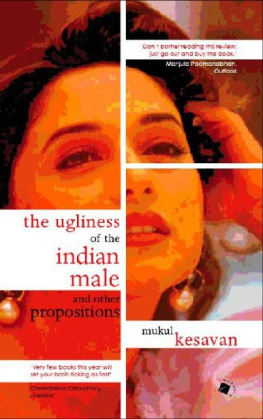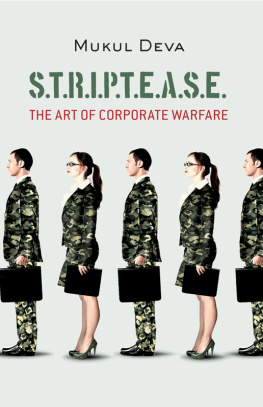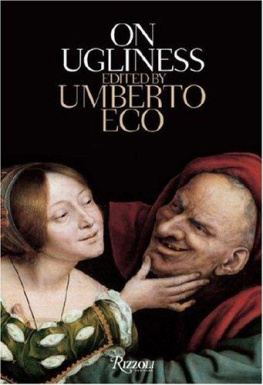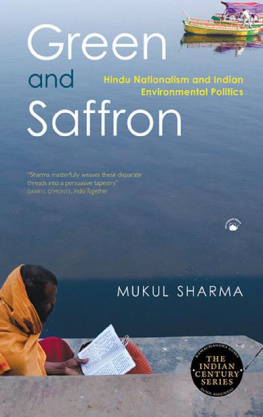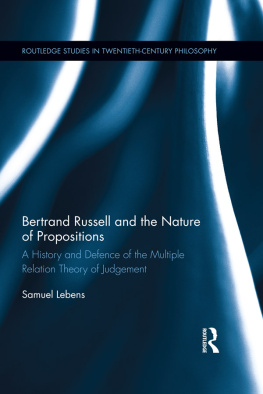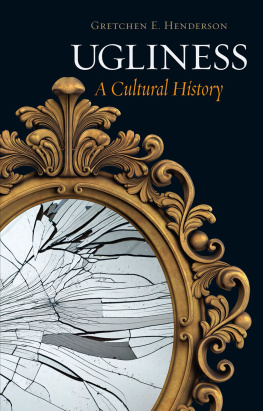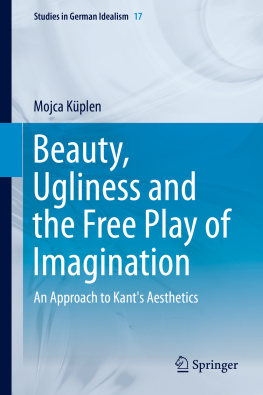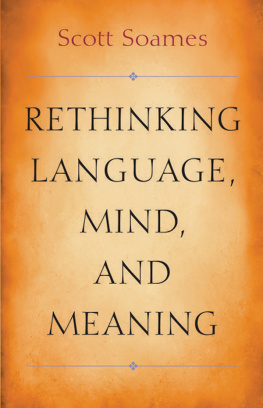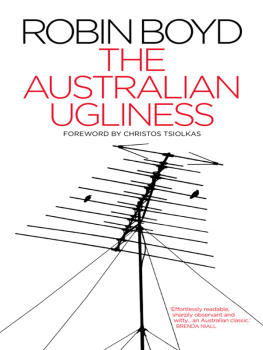Mukul Kesavan - The Ugliness of the Indian Male and other Propositions
Here you can read online Mukul Kesavan - The Ugliness of the Indian Male and other Propositions full text of the book (entire story) in english for free. Download pdf and epub, get meaning, cover and reviews about this ebook. year: 2018, publisher: Permanent Black, genre: Detective and thriller. Description of the work, (preface) as well as reviews are available. Best literature library LitArk.com created for fans of good reading and offers a wide selection of genres:
Romance novel
Science fiction
Adventure
Detective
Science
History
Home and family
Prose
Art
Politics
Computer
Non-fiction
Religion
Business
Children
Humor
Choose a favorite category and find really read worthwhile books. Enjoy immersion in the world of imagination, feel the emotions of the characters or learn something new for yourself, make an fascinating discovery.
- Book:The Ugliness of the Indian Male and other Propositions
- Author:
- Publisher:Permanent Black
- Genre:
- Year:2018
- Rating:3 / 5
- Favourites:Add to favourites
- Your mark:
- 60
- 1
- 2
- 3
- 4
- 5
The Ugliness of the Indian Male and other Propositions: summary, description and annotation
We offer to read an annotation, description, summary or preface (depends on what the author of the book "The Ugliness of the Indian Male and other Propositions" wrote himself). If you haven't found the necessary information about the book — write in the comments, we will try to find it.
The Ugliness of the Indian Male and other Propositions — read online for free the complete book (whole text) full work
Below is the text of the book, divided by pages. System saving the place of the last page read, allows you to conveniently read the book "The Ugliness of the Indian Male and other Propositions" online for free, without having to search again every time where you left off. Put a bookmark, and you can go to the page where you finished reading at any time.
Font size:
Interval:
Bookmark:
Indian Male and Other
Propositions
Indian Male and Other
Propositions

PERMANENT BLACK
'Himalayana', Mall Road, Ranikhet Cantt,
Ranikhet 263645
Email:
Registered Office
3-6-752 Himayathnagar,Hyderabad
500 029 (Telangana), INDIA
e-mail:
Bangalore Bhopal Bhubaneshwar Chandigarh Chennai
Ernakulam Guwahati Hyderabad Jaipur Kolkata
Lucknow Mumbai New Delhi Patna
www.orientblackswan.com
of Hindi Cinema
Roots of Hindi Cinema
and His Kind
This seems mysterious but isnt. Our historian will have to be content with the ordinary cause instead of the off-centre insight. The obsession with Hindi movies is the easiest to explain. In the life of every anglophone Indian there occurs an epistemological break. Those who think this means a letter-writing recess should know that this is a deep way of describing a big change in knowing things. The big change comes about when the child acquires English. All the stuff the child liked before learning English becomes connected with uncomplicated enjoyment in the grown-ups mind because the child is father of the man. (I know Wordsworth wrote that line but it needs another the.)
Since English becomes the language in which he learns things, the Indian man begins to associate Hindi films with unlearnt pleasure.This is a delusion: metropolitan children begin learning English around the time they go to school, and how many Hindi films can you remember seeing before you were six? Somewhere in the range of not many and none. This doesnt matter because the adult middle-class Indian male, now socialized so thoroughly into English that he finds it hard to summarize an abstract thought in his mother tongue, begins to see Hindi films as the lost hinterland that connects him to the Bharat-thatisnt- India. The Hindi film becomes his passport to des and his ability to write about Hindi films demonstrates (both to himself and the world) his authentic connectedness. None of this rules out the possibility that he actually enjoys Hindi films: it just explains why he writes about them.
He reviews English novels for the opposite reason that he sees Hindi films: if Hindi films are his umbilical connection to his authentic mofussil self, reading and writing about English fiction is the open sesame that gives him entry to a properly metropolitan world. His delight in Hindi films springs from a precious, nurtured state of innocence, whereas his connoisseurship of English fiction allows him to be knowing in a cosmopolitan way. The ability to put out a view about the oeuvre of Robert Musil or Anthony Powell or Machado de Assis (for him these are all English novelists because he reads them in translation) is for him the literary equivalent of a one-arm push-up: something most people cant do.
He travels and writes about his travels for reasons very similar to the ones behind his interest in English fiction, but on the whole he does this less successfully. Travel writing, as invented by English and then American writers, is a form of amused knowingness. Reading Robert Byron or Paul Theroux is a bit like tuning into Radio Supercilious: the funny bits, such as they are, are generated by the discomfort of travelling to out-of-the-way places or via encounters with amusing aboriginals. This form of knowingness isnt easily replicated: you have to be first world and better off than the natives. If youre Indian this is a problem, so the dominant form of Indian travel-writing is the short magazine article because its hard to act richer (or whiter) than you are for any length of time. The scope for knowingness and sophistication is consequently limited. It isnt a coincidence that writing about food and drink is the fastest growing segment in Indian journalism because writing about Chinese restaurants in Juhu is a way of travelling without a passport, of being sophisticated on a budget.
On the rare occasions that Indian writers attempt travel books Vikram Seths From Heaven Lake, Amitav Ghoshs In An Antique Land, Allan Sealys From Yukon to Yucatanthey produce work that in tone and form redefines the genre because they treat the landscapes they move through as dense, real places, not as props and cues that help the sophisticated traveller rehearse his world-weary routines.
But it is the English-writing Indians interest in communalism, particularly his near-obsessive interest in the way majoritarian politics picks on religious minorities, which is likely to draw the particular attention of our historian. Perhaps hell take his cue from that acute critic, Lal Krishna Advani, who coined a useful term for this tendency: pseudo-secularism. In this view, since the majority of secularist critics are nominally Hindu, this peculiar interest in Muslim or Christian welfare is to be charitably understood as a form of misguided chivalry: misguided because its apparently Hindus who are harassed and discriminated against in the name of secularism. When a critic of the Advani School isnt feeling charitable, this chivalric tendency is put down to the self-hatred that afflicts deracinated Hindus. Other hostile observers see the secularist tendency as an extension of the knowingness and superiority affected by this sort of Indian in other matters, such as fiction or travel-writing, a posture intended to place the posturer above the common herd.
Whatever their explanation, these regularities in the behaviour of anglophone Indians await their historian and their anthropologist; the book that follows is an attempt to show that their habits are odd enough to be interesting.
Font size:
Interval:
Bookmark:
Similar books «The Ugliness of the Indian Male and other Propositions»
Look at similar books to The Ugliness of the Indian Male and other Propositions. We have selected literature similar in name and meaning in the hope of providing readers with more options to find new, interesting, not yet read works.
Discussion, reviews of the book The Ugliness of the Indian Male and other Propositions and just readers' own opinions. Leave your comments, write what you think about the work, its meaning or the main characters. Specify what exactly you liked and what you didn't like, and why you think so.

